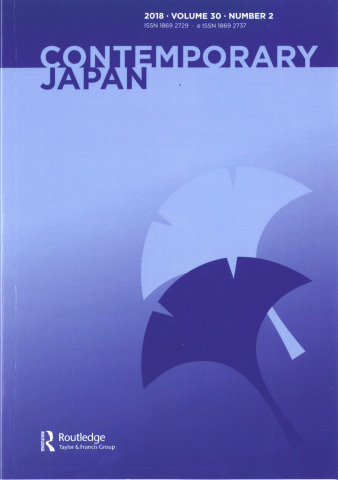Contemporary Japan 30, No. 2

Inhalt
Pop culture contents and historical heritage: The case of heritage revitalization through ‘contents tourism’ in Shiroishi city
The objective of this study is to clarify the processes of contents tourism promotion and local cultural heritage revitalization using pop culture contents or popular media. Specifically, this article analyzes the potential of games and anime to play a role in the revitalization of regional historical resources. As a case study, it focuses on the case of Shiroishi city, Miyagi prefecture, in northern Japan and the video game and television anime Sengoku BASARA. This article describes how the local community reacted to a tourism boom triggered by the game and anime, and how they took advantage of the renewed interest in their local history created by popular cultural forms to revitalize historical heritage in the city. The findings suggest that a key to the successful use of game contents to promote historical tourism is for the game/anime to be treated as an opportunity, and to have the fans of the game/anime become fans of the local region. Such a process encourages local residents to feel pride towards their local history. These suggestions imply the possibility of new forms of tourism where new cultures can be created by revitalizing local heritage.
pp. 144-163
Protecting Japan from immigrants? An ethical challenge to security-based justification in immigration policy
This article contributes to the growing interest in both the ethics of immigration and Japanese immigration studies by analysing the ethical justification of Japan’s immigration policy. The main objective of this article is to specify and address security-based justifications as part of an investigation into the ethical dimension of Japan’s immigration policy. Security is systematically drawn upon as one of the most powerful rationales to justify the competence claimed by Japan to control immigration as it deems adequate. The article will first specify the types of justification at stake. Second, it unpacks four understandings of security in immigration matters: as public order, as protection of welfare mechanisms, as cultural stability and as protection of social trust. Each of these justifications is bound with specific ethical challenges. Overall, the article maps the different justification strategies, their shortcomings and their advantages. The article intends to launch a proper ethical debate on Japan’s immigration policy.
pp. 164-188
The last suffrage movement in Japan: Voting rights for persons under guardianship
In the 1990s, only four of the 63 democratic countries of the world opted to give the right to vote to people with mental health problems and/or intellectual disabilities. However, by the late 2000s, 11 countries, including Japan, had lifted all restrictions and granted those people the right to vote. These changes were justified based on international factors such as the Convention on the Rights of Persons with Disabilities, which was drafted in 2006. However, as shown by the fact that some countries have granted this right and other countries have not, even among countries that ratified the Convention on the Rights of Persons with Disabilities, foreign pressure has had varying effects. Therefore, it is necessary to analyze domestic political processes in order to explain the increasing number of countries granting full voting rights to people with mental/intellectual disabilities.
In Japan, people under guardianship gained the right to vote in 2013. Why and how did this happen? This article examines Japan’s domestic political processes regarding this right, and clarifies the conditions under which it was recovered. The article reveals how the investigation into the process of making domestic legal changes, which is required to ratify treaties related to the rights of people with mental and/or intellectual disabilities, led to an important discovery regarding the constitutional basis for denying voting rights. People with disabilities and their supporters claimed that the qualification clauses of the Public Offices Election Act were unconstitutional. The resultant rulings in favor of the plaintiffs directly led to legal revisions.
pp. 189-203
Regulating risks in healthcare in Japan: Between new politics and the tradition of liberal practice in medicine
Liberal practice in the medical professions has long been the tradition and de-facto position of the Japanese government. However, accountability and transparency in healthcare governance have recently drawn scrutiny, primarily due to several adverse events in hospitals. While New Public Management and risk-based approaches have not penetrated the design of regulatory management and compliance strategies, there has been increased institutional capacity and a search for a new mechanism of regulating risks in healthcare. This paper attempts to identify the directions of policy developments in Japan. It questions whether the conventional model of professional self-regulation in medicine is eroding, as in many English-speaking countries. The article demonstrates that while we may identify some common trends such as greater transparency and the creation of arm’s length bodies, policy decisions prove deeply embedded in governance arrangements, and professional self-regulation in healthcare remains resilient, particularly in Japan.
pp. 204-226
Prolonging working life in Japan: Issues and practices for elderly employment in an aging society
As a result of the rapidly aging society, Japan’s public policies and related academic research have sought to address issues related to the employment of older workers. However, these efforts do not sufficiently consider how human resources management practices might facilitate effective policies. In response, this study investigates both the challenges and the solutions that employers have adopted to deal with an aging workforce. In particular, the authors argue that practices developed mainly by smaller enterprises might offer insights for larger companies that attempt to support the employment of elderly workers. An empirical analysis of the human resources management practices employed by 27 Japanese companies provides novel insights into how companies can ensure the prolonged employment of older workers while also motivating their work performance.
pp. 227-242